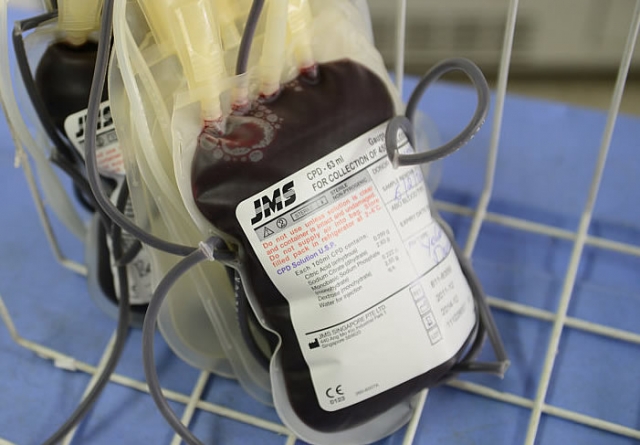Experts agree to develop robust blood transfusion services in Ebola affected and unaffected countries

Brazzaville, 8 June 2015 - Blood safety experts have agreed to develop robust blood transfusion services (BTS) in Ebola affected and unaffected countries to enhance preparedness for future outbreaks of infections with epidemic potential. Strengthening BTS would also have a direct benefit for tackling regional public health priorities including maternal and child mortality.
During a meeting held at the WHO Regional Office for Africa in Brazzaville (Congo) from 2 to 4 June 2015, experts consolidated plans to strengthen BTS in Ebola affected and unaffected countries, and adopted a series of recommendations. These include the validation of plans to strengthen national BTS and their integration into their health systems recovery plans, the funding of BTS plans by governments and partners, the review of strategic plans for blood safety and the establishment of a regional blood safety network.
"We must strengthen our blood safety services, develop human resources capacities and reinforce logistics. If the ministries of health and the governments are fully committed to supporting our plans we will go far," said Mrs. Lwopu M. Bruce, Programme Manager of the National Blood Transfusion Service of Liberia.
The World Health Organization and its partners will provide support to countries at various levels, including resource mobilization for the implementation of National BTS plans, advocacy for integrating blood safety in the national health development plans, and strengthening the legal and regulatory framework for blood safety.
Speaking on behalf of the Director, Health Systems and Services Cluster at the WHO Regional Office for Africa, Dr Ossy Kasilo, Coordinator, Health Technologies Programme, urged countries "to validate blood safety plans, and advocate vigorously and rapidly for their integration into their health system recovery plans. The national BTS have a crucial role to play in the response to the epidemic as long as cases of Ebola virus disease are still occurring."
"Liberia is now free of Ebola and both Guinea and Sierra Leone are making progress towards making zero cases. This is the time to redouble efforts to ensure that this outbreak is brought to an end. The goal of achieving zero cases in the last countries affected by the epidemic and the establishment of robust preparedness plans in these countries and in those that are not affected by Ebola must be a top priority for all countries", said Dr Kasilo.
The Brazzaville meeting also stressed the need for BTS to ensure that their voices are heard in the setting of the national health agenda, and to continue enrolment into the ongoing studies on the use of convalescent blood (CB) and convalescent plasma (CP) for transfusions of Ebola patients.
The meeting was attended by BTS Programme Managers in countries affected by Ebola and those that share land borders with them (Côte d'Ivoire, Gambia, Guinea Bissau, Mali and Senegal), those with experience in the fight against the epidemic (Democratic Republic of Congo, Nigeria) and national health authorities of these countries.
The health partners present at the meeting were among others: African Union, Bill and Melinda Gates Foundation-Unites States, UNFPA, Safe Blood for Africa, CDC Atlanta, and Clinical Research and Management-United States.
Clinical trials of the CB and CP in Guinea, Liberia and Sierra Leone are also supported by the following partners: Institute of Tropical Medicine Antwerp-Belgium, Pasteur Institute-France, Etablissement Français du Sang-France, University of Liverpool, Oxford University, London School of Hygiene & Tropical Medicine-United Kingdom, Clinical Research Management-United States, and Doctors without Borders.
_____________________________________
For additional information, please contact:
Technical contacts:
Dr Ossy M.J. Kasilo +47241 39268 - kasiloo [at] who.int
Dr Andre Loua + 47241 39250 - louaa [at] who.int
Dr Dicky Akanmori + 47 241 39112 - akanmorib [at] who.int
Communications contacts:
Flavienne Issembe + 47241 39352 - issembef [at] who.int
Cory Couillard + 47241 39995 - couillardc [at] who.int



